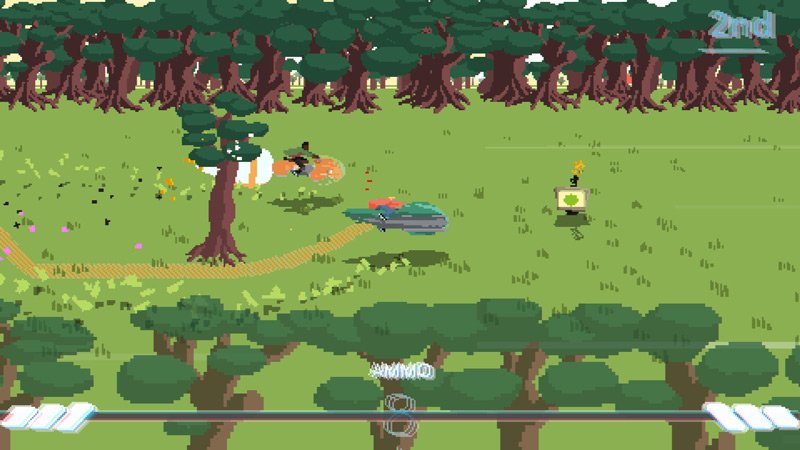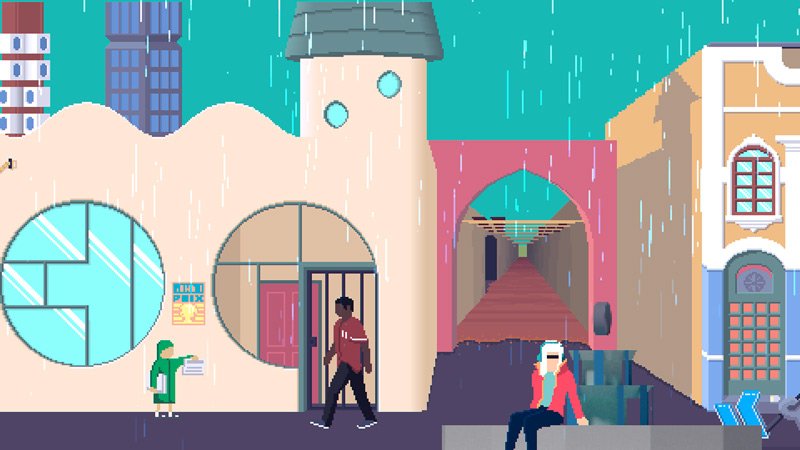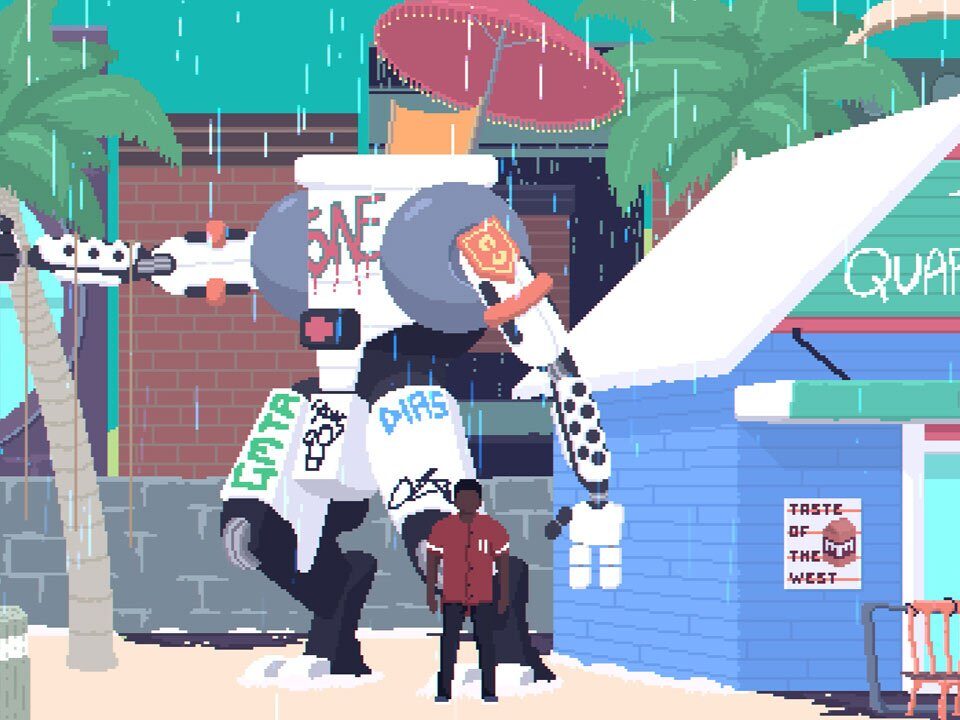Entering the visually striking pixel-art world of Desert Child, you’d be forgiven for initially believing it to be the video game love child of Akira and Cowboy Bebop we’ve all unknowingly wanted for years.
It’s undoubtedly easy on the eyes, the retro aesthetics and DOS-inspired gameplay initially providing one of the most ostensibly mesmerising indie-games in recent memory. Yet, it doesn’t take long to realise Desert Child’s beauty is merely skin-deep; the stylish exterior gives way to a hollow RPG-racer that doesn’t have enough variety, polish or depth to keep your attention span past the first couple of hours.
The premise of the game is simple. You’re a nameless, young, talented hoverbike rider living on a grimy, futuristic interpretation of Earth. You have no money, no job and no home. Eager to spread your name, you seek to enter the biggest hoverbike race in the Solar System; the prestigious Grand Prix on Mars. From here you must amass enough money to journey to the red planet, enter the contest and win the top prize, earning yourself money, fame and the prestigious title of the greatest racer in the Solar System.
If that sounds like a basic concept, it’s because Desert Child is a very basic game. Starting with the option of which weapon to mount on your bike – each coming with different difficulties based on their power and range – the core gameplay focuses around short, 2D, side-scrolling races. These races are, in themselves, actually a fun mini-game. Navigating up and down the screen, you must cycle between boosting your vehicle and firing your mounted gun at hovering TV’s to amass points, cash and additional boosts. The challenge becomes which you prioritise and at what moment. Destroying TVs will net you more money when crossing the finish line, but boosting gives you the edge on your opponent. Meanwhile navigating becomes essential on trickier stages, as hitting obstacles can leave the other racer with an opportune window to fire ahead.
It’s a well-designed mechanic that implements an engaging sense of risk versus reward, and while at times it can feel as if opponents don’t pose enough of a challenge – the AI unable to get far enough ahead to move off-screen and never increasing in difficulty until the final boss – it’s still Desert Child’s most entertaining gameplay asset. The problem comes from how often it’s roped into all aspects of gameplay.


Playing a race results in you earning around 150 dollars of in-game currency. Now, to even reach the dusty shores of Mars you must net yourself 500 dollars to buy a ticket, a feat that is achieved through repetitively racing the AI opponents until you’ve scraped together enough money to progress. The catch here is that you must also pay to keep your bike in good shape and your protagonist fed, two side-objectives that cost significant amounts of money and make amassing cash even more of an agonising chore. The moment you escape Earth and head for the surface of Mars, your patience with non-stop racing is wearing thin. Determined to break whatever will you have left, the game then decides to lump you with an even heftier 10,000 dollar goal.
Granted, this would be acceptable if the game provided as much variety as it appears to have when first approaching this new area. Reaching Mars opens up plenty of new opportunities and areas to explore. There are music shops, banks, seedy clubs, bike shops and the added surveillance of local police. While the exploration is infuriating at first due to the complete absence of a map or directions to where any essential locations are, adventuring around Mars has some exceptional moments, especially due to the developer’s wry sense of humour. Grafitti covers the streets providing a unique urban glow that compliments the retro visuals perfectly, while the lo-fi hip-hop soundtrack present in the background gives the game a subtle, much-need edge.
Yet, while this portion of the game opens the doors to new side-activities they’re, rather annoyingly, all subtle variations of the already overused racing minigame. Instead of battling other racers, you’ll herd kangaroos, catch criminals and even deliver pizzas, all of which reutilise the exact same mechanics you’ve been playing with for hours. These also extend to criminal activities, allowing you to rob banks, steal bike parts and throw races to earn much greater amounts of cash than in normal activities. Unfortunately, these are also just alternate takes on the races, however, they introduce a reputation system in which you gain police attention based on your spree of crimes. Gain enough attention and you might be stopped by the cops and, if caught, be asked to pay a hefty fine. This has its frustrating issues, such as a ridiculously hard chase sequence which has an unclear objective and an unbelievably high fee deducted if losing, but the idea is interesting and makes trying to amass wealth quickly come with high stakes.


One of Desert Child’s other major problems is its technical issues. Written dialogue is riddled with grammatical mistakes; a ‘new game’ button can be accidentally pressed in the pause screen that wipes all your data without warning; and the pizza delivery minigame seemingly accidentally scatters a particular TV powerup, despite the fact it isn’t breakable or acquirable in that particular side-activity. Although these don’t detract from the game entirely, they can occasionally show the game’s rough edges and lack of polish.
Desert Child is by no means a terrible game. The racing, initially, is a lot of fun and the retro, pixel-art visuals alongside the terrific soundtrack make for an experience that is undeniably packing some serious style. But it’s this potential that makes the game’s structural issues and lack of variety such a letdown, ruining what has the potential to be a truly exceptional indie experience. The ideas are there and the groundwork is laid, but unfortunately for Desert Child, it can’t seem to get them off the ground in any meaningful way.
Game: Desert Child
Platform: Nintendo Switch (reviewed), Xbox One, PS4, PC
Developer: Oscar Brittain
Publisher: Akupara Games
Release Date: Out Now






